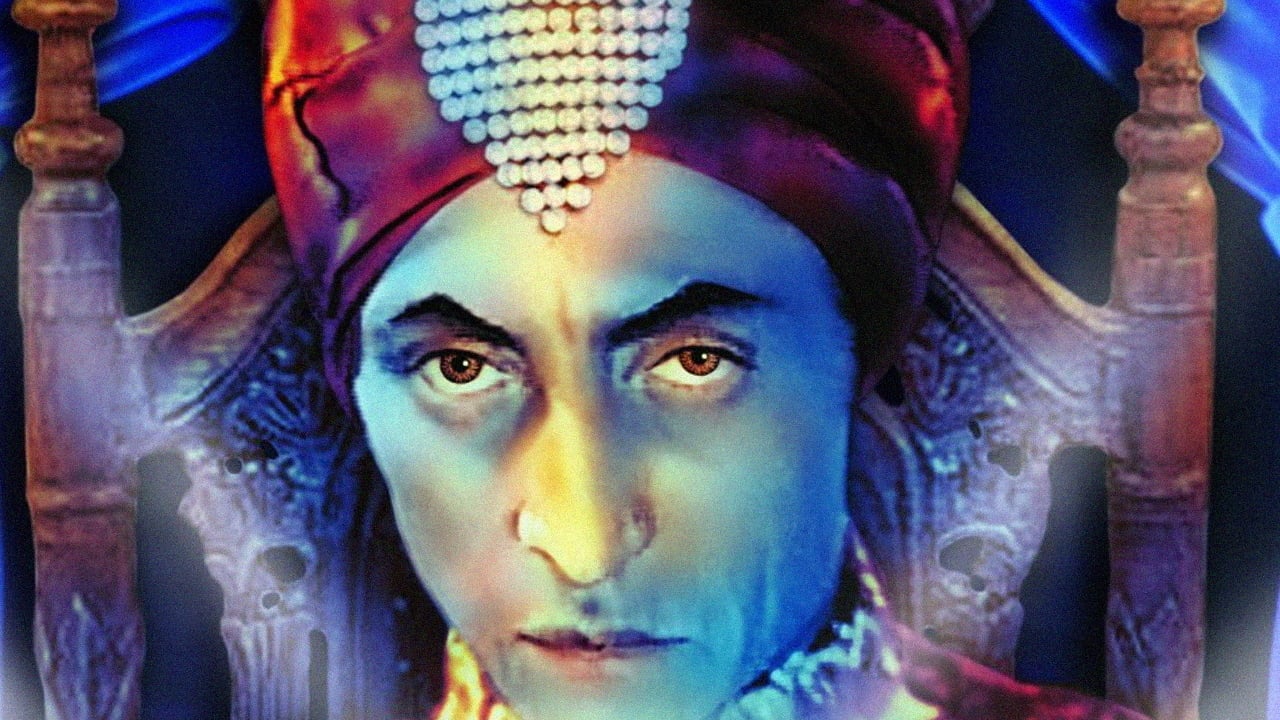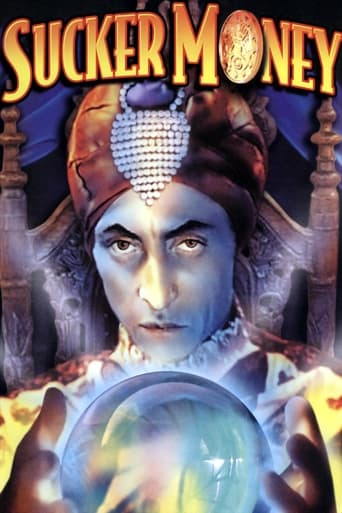

Good start, but then it gets ruined
... View MoreBrilliant and touching
... View MoreThe story, direction, characters, and writing/dialogue is akin to taking a tranquilizer shot to the neck, but everything else was so well done.
... View MoreThe film's masterful storytelling did its job. The message was clear. No need to overdo.
... View MoreAgain Phyllis Barrington had the female lead in this follow up to "Sinister Hands" but once again she was completely overshadowed, this time by veteran Mae Busch playing an alcoholic singer employed by the sinister Swami in his fake fortune telling racket. Mischa Auer impressed as the mysterious Swami Yomurda in "Sinister Hands" the year before so he was back again in "Sucker Money". In this movie his sinisterness is exposed as downright evil - all owing to the co-director Dorothy Reid. She had been married to Wallace Reid and his death, from narcotics, led her on a one woman crusade to expose the menace of drugs through films. After ten years of films like "Human Wreckage" and "The Red Kimona" she turned to another social evil that was reaching plague proportions in Hollywood - the phoney spiritualism racket!!Jimmy Reeves, reporter (Earl McCarty, a younger dead ringer for Jack Mulhall, star of "Sinister Hands", what happened, wasn't he available??), is ordered by his boss to apply for a job in which actors are wanted - he hopes Jimmy will be able to write an expose on crooked psychics. While there he meets Claire (Phyllis Barrington) whose father is being persuaded to invest in a phoney oil field by another of the Swami's actors. Veteran Mae Busch steals the movie with her portrayal of "Beautiful", an alcoholic ex singer who jumps at the chance of helping Jimmy expose these crooks. Of course Claire recognises Jimmy and feels he is part of the con but when he explains things he is overheard and sets in motion the thrilling climax where Claire is kidnapped and hypnotized and "Beautiful" saves the day by escaping to send an SOS to Jimmy's paper.The theme of fake spiritualism has been shown to better advantage in any film you could name - "Darkened Rooms" (1929), "The Hole in the Wall" (1929), even the later "Bunco Squad" (1950) but Mae Busch makes this one seem better than it is by her professionalism.
... View MoreI love museums and museum pieces. This is not a good movie but it gives an insight into a time that no longer exists - old-fashioned furniture, clothes and habits that went out of style way before many of us were born.That would be the only reason to see this picture.You can also see Mischa Auer before he became a pop-eyed relief comic in many musicals of the 30's and 40's, as well as some lesser-known actors who are long-gone.The plot line is negligible and far-fetched but it's fascinating to ponder how popular psychics were in the '30s. Also nice to see the 'ever-popular Mae Busch', as Jackie Gleason used to put it on his show. Evidently a pretty good actress who lacked timeless beauty.In short, Sucker Money is a curiosity not recommended except as a trip to the museum.
... View MoreI wouldn't have bet a plug nickel that "Sucker Money" would wind up as entertaining and interesting as it turned out to be. It had the look and feel of those 1930's era 'educational' films that purported to warn the viewer about the dangers of illicit drugs, alcohol or sex, but in this case the film was an attempt at exposing the psychic racket. The story actually had decent continuity, even if some of the players presented were extremely over the top, starting with the phony Swami (Mischa Auer), and including characters like Princess Karami (Mona Lisa, why not use her real name?), and the two black bodyguards dressed in their own set of Indian Hindu garb. Seeing them, I knew it was only a matter of time before the flick fell into racial stereotype, and they're shown throwing dice in a subsequent scene, as reporter Jimmy Reeves (Earl McCarthy) notes to the one rolling a winner - "Yo' sho' is lucky, Big Boy"! The thing is, while watching, I got a sense that old Swami was a truly evil guy, and it wouldn't take much for him to dispose of anyone who got in the way of his making a really big score. Which got kind of wasted when he discovered Reeves' real identity as a newspaper reporter, and then just let him roam around fairly freely within the confines of the operation. You would think that Jimmy would be a quick goner, and the Swami and his crowd could have pulled off the twenty thousand dollar heist of old Walton without any further trouble. It also seemed pretty convenient that the law showed up in time to make the save, but this was over seventy years ago, and there wasn't a whole lot of time and effort that went into making a story believable if put under a microscope. Which is OK if it passes the entertainment test, and I think this was a good try if one's not too critical.I really have to thank Mill Creek Entertainment for putting out a package that makes pictures like this available to old time film junkies like myself; without them one would never even know that they existed. This one was part of a two hundred fifty movie set on sixty double sided DVD's as party of their Mystery Collection. The great thing is, by the time you get around to viewing all the movies in the set, you wind up forgetting what the first ones you saw were all about, and you can go ahead and do it all over again!
... View MoreWith a bunch of gullible types like this film presents, we could all make a fortune off them. They even fall for things like a back projection of film, thinking it has some magical quality. The bad guys are good at bilking unsuspecting bank presidents and rich widows by making contact with loved ones. This sounds interesting until you see it. It has that old cliché of getting rid of all your problems except the one that is the biggest danger. Why not shoot the reporter who is on to your whole scheme when you are bumping off everyone else? I'm sure mysticism would have appealed to the viewers of the time, but this is just as dull as can be. The only people I cared about were the black guards who were obviously only in it for the cash. They at least had personalities, though they had all the racial stereotypes of the era.
... View More